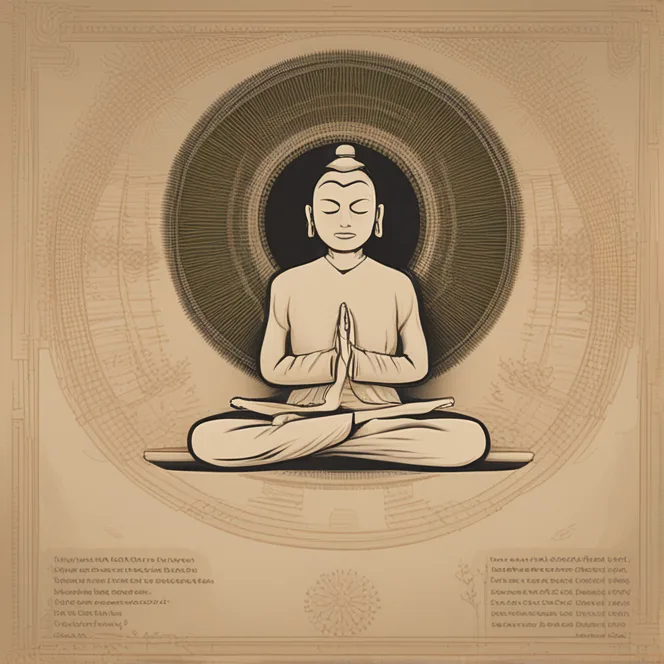
Harnessing Meditation For Stress Relief & Relaxation
Discover the nuances of meditation as a practice for relaxation and how it transcends basic stress relief techniques.
article by Hina Kurosawa
The Essence of Meditation
Meditation has long been practiced by civilizations around the world as a profound tool for cultivating peace and balance. It is a technique that actively engages the mind in fostering a sense of calm and heightened awareness. Unlike other relaxation methods that may only focus on the physical aspect of stillness, meditation encompasses a deeper mental and emotional serenity. This ancient practice involves various methods, including concentration, mindfulness, and transcendental techniques, all aiming to achieve a tranquil state of being. The very essence of meditation transcends its role as a simple relaxation technique by promoting an in-depth psychological as well as spiritual harmony.

Benefits Beyond Relaxation
Meditation is not just about achieving a momentary sense of relaxation. It carries with it a cascade of benefits that impact an individual's well-being on many levels. Studies have shown that regular meditation can reduce stress, anxiety, and depression. It can also improve focus, cognitive function, and emotional health. Meditation has the potential to foster a sense of connectedness, elevating one's state of consciousness and nurturing a sense of purpose. The depth of relaxation achieved through meditation can lead to lasting changes in the way we handle the pressures of daily life, rendering it a transcendent tool far beyond that of a simple stress-reliever.
Differentiating Relaxation Techniques
Various relaxation techniques exist, ranging from deep breathing exercises to progressive muscle relaxation, each with their own merits. However, meditation differentiates itself by encouraging a transformation within the practitioner. It hopes to rewire thought processes, offering a profound mental remodeling that can accommodate a more enriching and less reactive experience of life. When we talk about the act of meditating, we are referencing a holistic development of the self, whereas typical relaxation techniques may only temporally alleviate physical or mental tension without long-term cognitive and existential impacts.

Integrating Meditation into Daily Life
Incorporating meditation into one's daily routine can provide a stable foundation for stress management and personal growth. It is a practice that can be adapted to any lifestyle, requiring as little as a few minutes a day. Over time, the cultivation of a meditative practice can lead to profound transformations in one's approach to challenges and stressors. By maintaining a regular schedule and creating a dedicated space for meditation, individuals can solidify it as a crucial part of their relaxation repertoire, ensuring they reap the expansive benefits that extend well beyond the time spent in silence.

The Practice of Patience & Consistency
Like any skill, the benefits of meditation are most profound when the practice is consistent. The depth of relaxation and mental clarity one experiences can increase over time as the mind becomes more adept at entering a meditative state. This requires an element of patience and perseverance that goes hand in hand with meditation. It's not interchangeable with a quick fix provided by momentary relaxation but is instead a life-enriching journey that gradually unfolds with practice. Patience in meditation builds strength and resilience, allowing for an ever-expanding appreciation of the peaceful moments it brings.
Published: 12/4/2023
Modified: 12/4/2023
More predictions
Come back here soon to learn more about yourself and your future


The Evolution of Meditation Practices
In the realm of astrology, Saturn, often referred to as the taskmaster of the zodiac, plays a unique and profound role in shaping our approach to love and relationships. While often associated with challenges and obstacles, Saturn's influence on our love lives can be seen as a powerful teacher, guiding us toward the creation of enduring and meaningful connections. This article explores Saturn's lessons in love, offering insights into how this celestial force can help us build lasting and fulfilling bonds.


The Silent Meditation Tradition
In a world filled with constant noise and distractions, the practice of silent meditation stands as a sanctuary of stillness. Rooted in ancient wisdom and embraced by various spiritual traditions, silent meditation offers a transformative journey into the depths of one's consciousness. In this exploration, we embark on a contemplative voyage to understand the essence of silent meditation, its history, techniques, and the profound benefits it offers to those who embrace its practice.


Journaling As A Meditative Practice
Meditation comes in various forms, and one particularly accessible and beneficial method is journaling. While we often associate meditation with sitting in silence, journaling offers a unique meditative experience that allows individuals to explore their thoughts, emotions, and inner selves on paper. In this article, we will delve into the art of journaling as a meditative practice, exploring its numerous benefits for mental well-being and self-discovery.